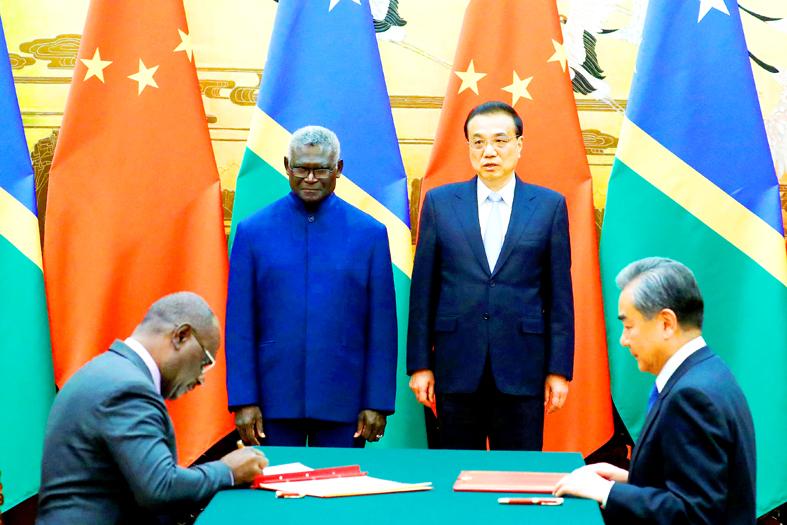Solomon Islands Prime Minister Manasseh Sogavare yesterday said that the backlash to his nation’s security negotiations with China was “very insulting,” in his first comments on a security treaty he said was ready to sign.
Australia, New Zealand and the US have expressed concern about security negotiations between the Pacific island nation and China which became public last week after the leak of a draft security treaty, prompting concern over a Chinese military base in the region.
Sogavare yesterday told parliament that the leaked security document was a draft and he would not give details on the content of the final deal.

Photo: Reuters
“We are not pressured in any way by our new friends and there is no intention whatsoever to ask China to build a military base in the Solomon Islands,” he said.
The Solomon Islands switched diplomatic allegiance to China from Taiwan in 2019.
New Zealand Prime Minister Jacinda Ardern on Monday said that it was a “potential militarization of the region,” while Australian Minister for Defence Peter Dutton said Canberra would be concerned if the deal led to a Chinese military base in the Pacific.
Sogavare expressed criticism of larger nations who he said did not care if Pacific islands went under water because of climate change and considered the region “the backyard of big Western powers.”
He also denied opposition claims that a pact with China would lead to an autocratic government.
During anti-government riots last year, Sogavare said the Chinatown district in the capital Honiara was burned down and there were also threats to sports infrastructure for next year’s Pacific Games, a reference to seven stadiums being built by China.
“If any country does not have the political appetite to do that, we must have an alternative arrangement in place,” he said.
The leaked draft said the security treaty would allow China’s armed police and the military to protect Chinese projects.
Chinese Ministry of Foreign Affairs spokesman Wang Wenbin (汪文斌) yesterday in Beijing said that its “law enforcement and security cooperation” with the Solomons Islands was in accordance with the law and international norms.
“We hope relevant countries respect Solomons’ sovereignty and the decisions it made, instead of thinking condescendingly that they are entitled to demand what the Solomon Islands can or cannot do,” Wang said.

The Central Election Commission has amended election and recall regulations to require elected office candidates to provide proof that they have no Chinese citizenship, a Cabinet report said. The commission on Oct. 29 last year revised the Measures for the Permission of Family-based Residence, Long-term Residence and Settlement of People from the Mainland Area in the Taiwan Area (大陸地區人民在台灣地區依親居留長期居留或定居許可辦法), the Executive Yuan said in a report it submitted to the legislature for review. The revision requires Chinese citizens applying for permanent residency to submit notarial documents showing that they have lost their Chinese household record and have renounced — or have never

A magnitude 5.6 earthquake struck off the coast of Yilan County at 12:37pm today, with clear shaking felt across much of northern Taiwan. There were no immediate reports of damage. The epicenter of the quake was 16.9km east-southeast of Yilan County Hall offshore at a depth of 66.8km, Central Weather Administration (CWA) data showed. The maximum intensity registered at a 4 in Yilan County’s Nanao Township (南澳) on Taiwan’s seven-tier scale. Other parts of Yilan, as well as certain areas of Hualien County, Taipei, New Taipei City, Taoyuan, Hsinchu County, Taichung and Miaoli County, recorded intensities of 3. Residents of Yilan County and Taipei received

Taiwan has secured another breakthrough in fruit exports, with jujubes, dragon fruit and lychees approved for shipment to the EU, the Ministry of Agriculture said yesterday. The Animal and Plant Health Inspection Agency on Thursday received formal notification of the approval from the EU, the ministry said, adding that the decision was expected to expand Taiwanese fruit producers’ access to high-end European markets. Taiwan exported 126 tonnes of lychees last year, valued at US$1.48 million, with Japan accounting for 102 tonnes. Other export destinations included New Zealand, Hong Kong, the US and Australia, ministry data showed. Jujube exports totaled 103 tonnes, valued at

BIG SPENDERS: Foreign investors bought the most Taiwan equities since 2005, signaling confidence that an AI boom would continue to benefit chipmakers Taiwan Semiconductor Manufacturing Co’s (TSMC, 台積電) market capitalization swelled to US$2 trillion for the first time following a 4.25 percent rally in its American depositary receipts (ADR) overnight, putting the world’s biggest contract chipmaker sixth on the list of the world’s biggest companies by market capitalization, just behind Amazon.com Inc. The site CompaniesMarketcap.com ranked TSMC ahead of Saudi Aramco and Meta Platforms Inc. The Taiwanese company’s ADRs on Tuesday surged to US$385.75 on the New York Stock Exchange, as strong demand for artificial intelligence (AI) applications led to chip supply constraints and boost revenue growth to record-breaking levels. Each TSMC ADR represents